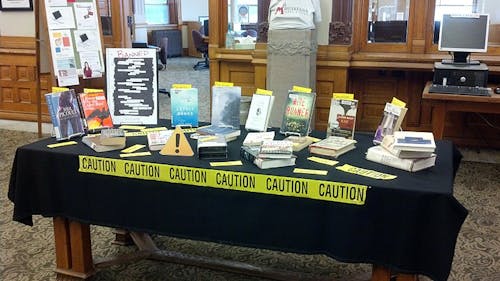ESCHLEMAN: Literary censorship is not ancient history — it is alarming
Column: Shower Thoughts

I remember scrolling through Instagram toward the end of summer and finding an alarming post from my favorite poet, Rupi Kaur. She has become an incredibly popular author among young people as she has popularized poetry through the use of social media, making her a sensation. She is a global figure as her poetry books have sold more than 10 million copies and have been translated into more than 40 languages.
Kaur’s post released on August 10 shows a screenshot of a list of 52 books that have been banned from Utah’s largest school district, the Alpine School District. The banned books list includes her own poetry book, "Milk and Honey."
In an article from The Washington Times, it describes how the Utah school district of 82,800 students defends its decision by citing a new law prohibiting “age-inappropriate materials” as some parents have criticized the books for being “pornographic.”
A Fox 13 Salt Lake City article, which includes the full banned books list, notes that two state library associations, The Utah Educational Library And Media Association and the Utah Library Association, have expressed concern over how large the recent book ban is and how quickly it was implemented.
Even though both of these associations “acknowledge that some books shouldn’t be in school libraries,” one cannot help but notice that a significant amount of the bans target literature that explores LGBTQ+ topics, feminine-coming-of-age stories and racism.
Aside from "Milk and Honey," other significant titles on the list include "Queer: The Ultimate LGBTQ Guide for Teens" by Kathy Belge and Mark Bieschke, "This Book Is Gay" by Juno Dawson, "What Girls Are Made Of" by Elana K. Arnold, "The Girl Who Fell from the Sky" by Heidi W. Durrow, "Two Boys Kissing" by David Levithan and many more addressing similar topics that dominate the banned books list.
In Kaur’s caption to the post, she shares her confusion and rage in response to the ban. She writes, “why milk and honey? because it explores themes of sexual assault, abuse and feminism.” She describes how her intent behind writing "Milk and Honey" was to “process” her “pain and trauma” and to bring “comfort” to those who have gone through similar hardships to hers.
She also expresses concern over how some of the banned books on the list include topics on “lqbtq+ themes … women’s issues, racism and anti-blackness” and how these bans hurt “young readers who need access to these books the most.”
Society has seen attempts in the past to censor sensitive and intense societal topics. In my sophomore year of high school, I read "Adventures of Huckleberry Finn" by Mark Twain, an American classic that takes place in the 1840s and emphasizes the disturbing nature of racism through satire. In the book, the N-word is said 219 times, making it a highly controversial piece of literature.
In 2011, an Alabama publishing company released a revised copy of the story that replaces the N-word with “slave” in hopes that the censored version would encourage school districts to take "Adventures of Huckleberry Finn" off their banned books list. This also contributed to the heated debate over the book.
Even though hearing the N-word so frequently throughout the book can be disturbing and exposes a troubling time in American history, it captures the rampant racism that plagued America and continues to impact the present.
When I saw Kaur’s post, it reminded me of the debate over "Adventures of Huckleberry Finn." I was shocked at the fact that literary censorship is still happening with modern texts like "Milk and Honey." By censoring and banning books like these that tackle the aspects of society that make people uncomfortable, it is essentially trying to hide the truth from students who are trying to learn and trying to become more aware individuals.
It is as if society is reverting back to an old-fashioned "don’t-talk-about-your-feelings" sentiment even as Generation Z challenges topics society used to smother into silence. Ultimately, this kind of literary censorship teaches students to be ashamed to ask questions and to discuss any hardships that they may be facing.
I think the intent behind censorship campaigns such as this is to shield children from life’s harsh realities. But the hard truth is that people at any age, especially in discriminated communities, can experience racism, questioning of their sexuality and sexual assault and harassment. In these cases, ignorance is not bliss.
Ignorance is harmful, and awareness is power. It is time to finally see awareness as essential instead of destructive and to recognize that literature is one of our greatest tools to achieve this and should remain accessible for all students across the nation.
Sara Eschleman is a Rutgers Business School sophomore majoring in marketing and minoring in English. Her column, "Shower Thoughts," typically runs on alternate Thursdays.
*Columns, cartoons and letters do not necessarily reflect the views of the Targum Publishing Company or its staff.
YOUR VOICE | The Daily Targum welcomes submissions from all readers. Due to space limitations in our print newspaper, letters to the editor must not exceed 900 words. Guest columns and commentaries must be between 700 and 900 words. All authors must include their name, phone number, class year and college affiliation or department to be considered for publication. Please submit via email to oped@dailytargum.com by 4 p.m. to be considered for the following day’s publication. Columns, cartoons and letters do not necessarily reflect the views of the Targum Publishing Company or its staff.



